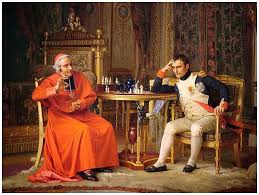From 1750 until about 1830 Paris and France were at the center of the world chess scene. Over the course of the 18th century, historical figures such as Rousseau, Voltaire, Diderot, Robespierre and Benjamin Franklin visited the famed Café de la Regence, where patrons played chess tirelessly from morning to night.
The Café was frequented by amateurs as well as famous chess masters, among which was one of the greatest chess players of all time, André Danican Philidor.
According to Harold Schomberg, Napoleon also visited the Café: for any true chess aficionado, the Café de la Regence must have been a must-see attraction. According to the rare chronicles of the time, short articles, what emerges is the picture of Napoleon as a chess player who was by no means sublime- if not mediocre judging by professional standards- and who nevertheless could not tolerate losing.
This aspect is exemplified by an apparently well-documented episode. On October 9, 1809, at Schönbrunn Castle in Vienna, he played against the “turk”, a well-known chess-playing automaton (a curiosity of the era: it was a peculiar machine in the guise of a Saracen which concealed a chess master who actually played the game). After two crushing defeats, Napoleon reportedly stormed out of the room in a rather disrespectful manner.
Napoleon was certainly a man of character, but he was not lacking in intelligence. He might have been no gracious loser (a trait common to many chess players), but, from a rational perspective, it is hard to believe that he did not realize he was no chess master. Being a chess enthusiast, he must have studied and observed many contemporary French chess players and drawn the inevitable conclusions.
The few reports of his games which have come down to us seem to reveal a passion for chess which far surpassed his talent. In the popular imagination, a strategist is supposed to be master of the battlefield and, with chess being a sort of battle on a small scale, the same rules should apply to it. Napoleon, who was able to succeed in Ulm, Austerlitz and Marengo, the unrivalled strategist who was capable of leading entire armies, should have been equally capable of maneuvering his rooks and pawns against any opponent to achieve the inevitable checkmate; true military genius knows no bounds, at least in the popular imagination, and this mythologized version of the Corsican General persists among black and white pieces.
(Translation by UJCE)
